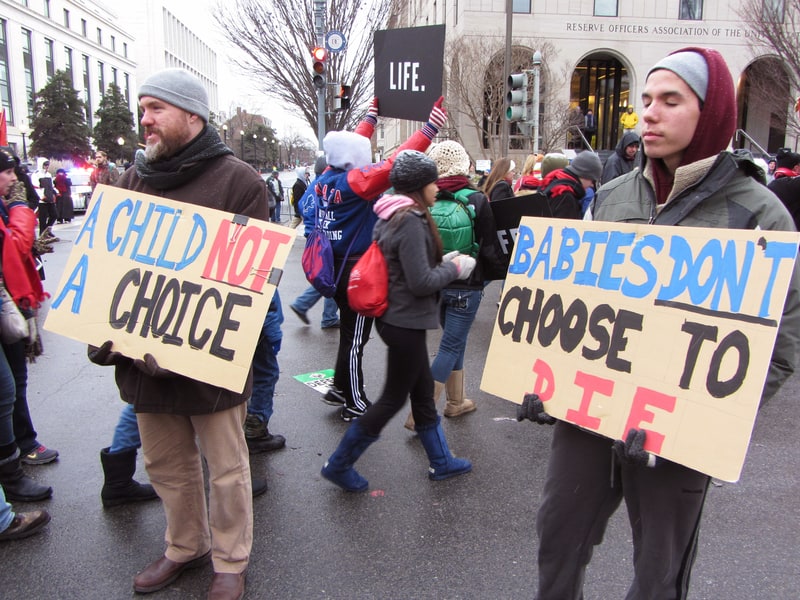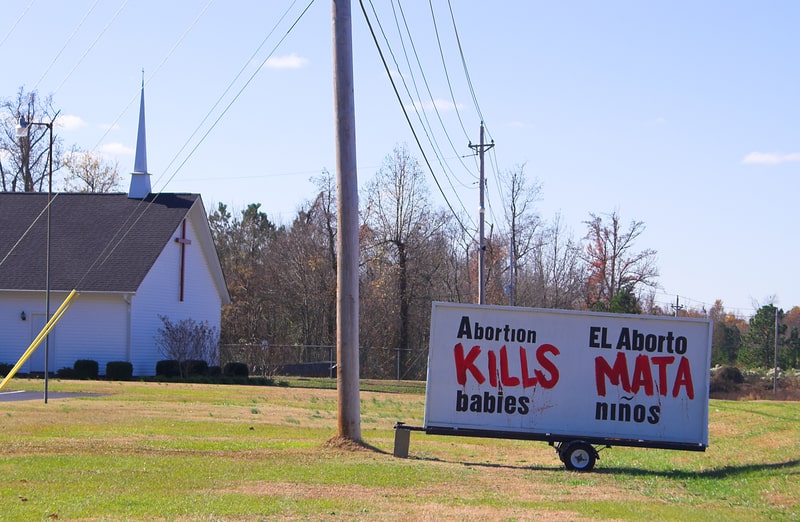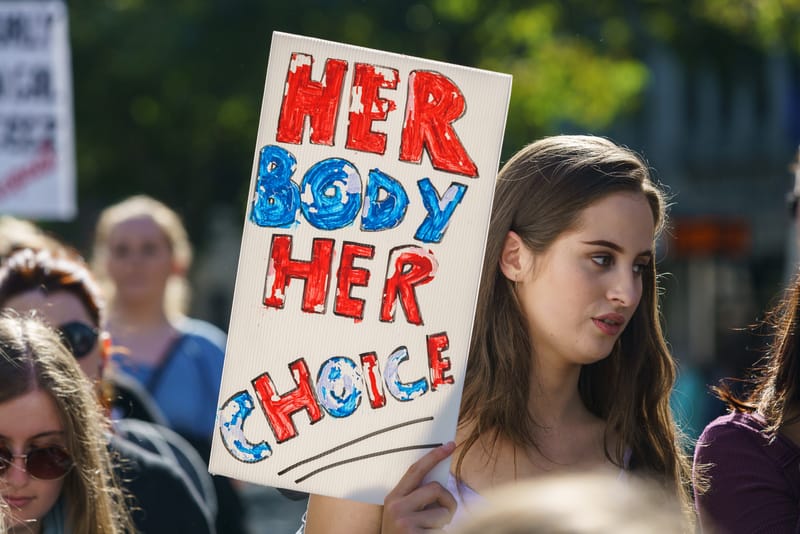As of this writing, abortion has moved to the forefront of national discourse in the US. In recent months, the US Supreme Court has heard challenges to two different state laws aimed at restricting abortion.
The current composition of the court has people on all sides of the debate anticipating rulings that might allow for increased regulation and restriction of abortion.
Christians in particular are paying close attention to these cases. And many are hoping and praying to gain some ground in a decades-long battle against the practice of abortion. However, some observers might not know the scripture and history that prompt so many Christians to take a stand against abortion.
So why, exactly, are Christians opposed to abortion?
Christians oppose abortion because abortion terminates a life. While lawyers, advocacy groups, and activists discuss matters such as choice, autonomy, and health, to the Christian, the fundamental crux of abortion is a life-or-death matter.
Recent History

For over fifty years, Western society has been debating the issue of abortion. And during that time, the debate has shifted with changes in society, as fewer and fewer people have a memory of a time when abortion was restricted.
That means that women of childbearing age have always lived in a culture where abortion was readily available. So any challenge to the accessibility of abortion is perceived as taking something away.
Combine this reality with the fact that supporters of abortion frequently engage the debate in terms of women’s rights, bodily autonomy, and even healthcare, and it becomes more challenging to see, much less articulate the Christian’s response.
So to start, we will step away from all of these other talking points, and consider the life-or-death question that drives Christian opposition to abortion: When does life begin?
The Beginning of Life
“Before I formed you in the womb I knew you,
before you were born I set you apart;
I appointed you as a prophet to the nations.” – Jeremiah 1:5
Scripture teaches that each person is uniquely made in the image of God and that we are made with intention and with a purpose. The Lord’s words to Jeremiah show that this creation process begins with the mind of God long before conception, and is carried out by the hand of God from conception to birth.

Paul echoes this understanding of the timing and purpose of our formation, saying in Ephesians 2:10 that “we are God’s handiwork, created in Christ Jesus to do good works, which God prepared in advance for us to do.” And David celebrates God’s work in his formation in Psalm 139, saying “you knit me together in my mother’s womb,” (v 13) and “Your eyes saw my unformed body” (v 16).
Reclaiming the Debate Narrative
As Christians, we must be deliberate in speaking of abortion as a matter of life and death. Two landmark court decisions in the United States have sidestepped this question and introduced new ways of speaking about the unborn that deflect from this core question.
Roe v Wade
The 1973 decision by the US Supreme Court in Roe v Wade declared that a fetus is not a person under the 14th amendment. Failing to address the biological question of life, the decision instead address the question of whether or not a fetus should enjoy the same rights as a born person.
Interestingly, the question of fetal rights is not new.
Ancient Rome codified property rights for the unborn, ensuring that any inheritance due an unborn child would be protected by a fiduciary. However, Roman law also provided protection for the life of the unborn, by prohibiting the execution of pregnant women, thus recognizing a distinction between the rights and status of a mother and her fetus.
Planned Parenthood v Casey
In 1992, the US Supreme Court issued a new ruling in Planned Parenthood v Casey that introduced a viability standard to laws that regulate or restrict abortion. In effect, the Court declared that if a fetus was developed enough to survive (with appropriate medical intervention) outside of the womb, then it was deemed viable, and the state could claim an interest in protecting the potentiality of life inherent in the fetus.
The ‘potentiality of life’ wording brought the debate closer to the original life-or-death question but still didn’t get us there completely. The trouble for Christians is that viability is a subjective idea, dependent on and beholden to the medicine and technology that are understood and available.
The markers of viability have shifted over time. Some ancient Greeks believed that the soul of a fetus developed gradually as the body developed. And in modern medicine, the Casey case was premised on medical advancements that shifted fetal viability up to four weeks earlier than it previously had been.
Heartbeat Bills
One of the two abortion laws to reach the Supreme Court in 2021 is the Texas law which prohibits abortion in cases where a fetal heartbeat is detected. This is as close as any modern legislation has come to returning the debate to the question of life, by using a measurable biological marker to determine whether or not a fetus is alive. For this reason, heartbeat bills are widely supported by Christians.
Focusing on Women

Viewing the question of life through the lens of scripture, it is easy for Christians to oppose abortion. And in doing so, we are quick to focus on the life and rights of the unborn. But sometimes, this produces the unintended result of causing us to neglect the plight of the women who are considering abortion.
In our zeal, perhaps we are too quick to dismiss some of the talking points that are found in differing perspectives. And in extreme cases, we needlessly and improperly cast these women as enemies in our discourse.
Supporters of abortion, and even some opponents, often cite concerns about women who have been victimized by rape, incest, sex trafficking, and abuse.
As Christians, we would be correct in concluding that such traumatic acts perpetrated against women are indeed horrific and should not be condoned. But we would also be correct in concluding that even if a pregnancy is the result of an act of violence, it does not lessen the status of the fetus as a unique living being.
So, even when we stand up and speak up for the unborn children, we must not do so at the expense of our decency and compassion toward the women who find themselves in difficult (and sometimes traumatic) circumstances.
Change through Compassion
“Religion that God our Father accepts as pure and faultless is this: to look after orphans and widows in their distress and to keep oneself from being polluted by the world.” – James 1:27
Some of the most vulnerable women facing the decision to abort are those who have been victimized, abused, or abandoned by men and left to fend for themselves.
Writing to a culture in which husbands and fathers were the sole providers and means of security for women and children, James calls on Christians to care for the women and children who have no provision.
And in our modern context, we honor these instructions when we come alongside vulnerable women, befriend them, hear them with listening hearts, and provide assistance as we are able.
This is not an effort that the church can engage through society’s political systems. It must be engaged at the human level by connecting directly with women in need. How our compassion and care manifest will vary according to the resources of our churches and the needs of those around us, but if we are prayerfully seeking a way to help, God will open our eyes to opportunities.
Compassionate Answers
For centuries, Christians have been at the forefront of operating orphanages and facilitating adoption. In the US, the secularization of the adoption process has resulted in some legal challenges for certain faith-based adoption agencies, but such agencies are far from gone, and still remain a vital component of the adoption process.
Crisis pregnancy centers are also predominantly run by churches and other Christian organizations. Standing as alternatives to abortion, some centers have been faced with legal challenges over their literature regarding abortion, but still stand ready to provide pathways to adoption or to motherhood.
Each center operates differently, but the core mission of all centers is to make motherhood viable for struggling women. This is achieved by providing education, job training, housing, and financial assistance, counseling, and other aid with the goal of helping mothers in need achieve financial independence and stability.
Start Small
Whether you are able to make deep commitments such as adopting a child or volunteering at a crisis pregnancy center, consider what you can do. Might your church be able to raise funds or donate supplies to a local center? Can you provide community meals where vulnerable women can get some nourishment and meet some compassionate listeners?
As we stand for the life of the unborn, let us remember that we must do so in a manner that shows as much love to mothers in need as we do to their children. It is not enough to just speak against abortion. We must live and act with compassion toward the women who are considering abortion. In doing so, we honor not only the words but also the heart of our Creator.




